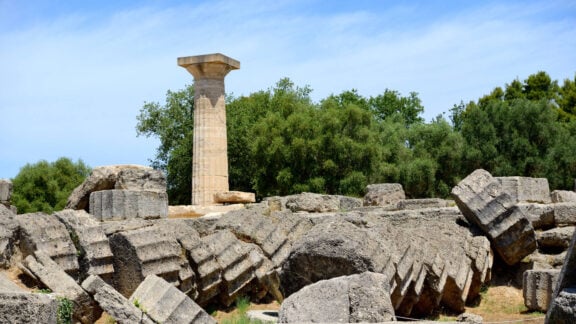The Battle of Kalamata, fought on 28 April 1941, marked the Allies’ final stand on the Greek mainland against invading German forces.
The Kalamata Association “23rd March” held a solemn ceremony at Melbourne’s Greek-Australian Memorial in Domain Gardens to mark the 84th anniversary of the battle yesterday, Sunday April 27.
Greece’s Consul General in Melbourne, Dimitra Georgantzoglou, Victorian Liberal Party representative David Davis, and leaders from the Greek Australian community all lay wreaths in honour of the Anzacs, Greek and other forces who fought and fell at Kalamata.
Codenamed ‘Operation Marita,’ the German campaign launched a pincer movement through Bulgaria and then-Yugoslavia to encircle Greek troops battling Italians on the Albanian front. A token Allied force of British, Australian, New Zealand, Cypriot, and from The Palestinian Protectorate troops—often referred to as ‘The Second Gallipoli’—arrived in March 1941 under the codename Lustre or ‘W Force,’ led by British Major General Maitland Wilson.
Of the 65,532 Allied soldiers sent to Greece, the largest fighting contingents came from Australia and New Zealand. Facing overwhelming German superiority—ten divisions and over 1,000 aircraft—the Allies fought fiercely but, ultimately, had to evacuate.

On the night of 28 April 1941, Australian, New Zealand, and British troops fought bravely against overwhelming odds in what became a defining moment in Greece’s wartime resistance. Kalamata, serving as a critical evacuation point, also witnessed extraordinary acts of civilian bravery, as locals risked their lives to aid Allied soldiers.
Sam Vlachos, President of the Kalamata Association “23rd March,” delivered a heartfelt speech on the importance of remembering those who fought and suffered there.
Despite desperate evacuation efforts, thousands were captured as German forces closed in. The brutality extended beyond soldiers; civilians suffered under the German advance, particularly at the hands of elite SS units, including the infamous 1st Motorised Infantry Regiment of the Leibstandarte SS Adolf Hitler Division, advancing from Patras and Pyrgos, alongside the 5th Panzer Division from Corinth and Tripoli. Fierce clashes erupted on Kalamata’s beaches and outskirts.
Between 7,000 and 8,000 Commonwealth and Yugoslav troops who could not escape were taken prisoner. Evacuations had begun on 25 April, carried out by small boats and Sunderland flying boats—one of which tragically crashed off Kordia. In the darkness of 27–28 April, Allied naval forces managed to rescue about 8,000 men, offering a final glimmer of hope amidst the devastation.







